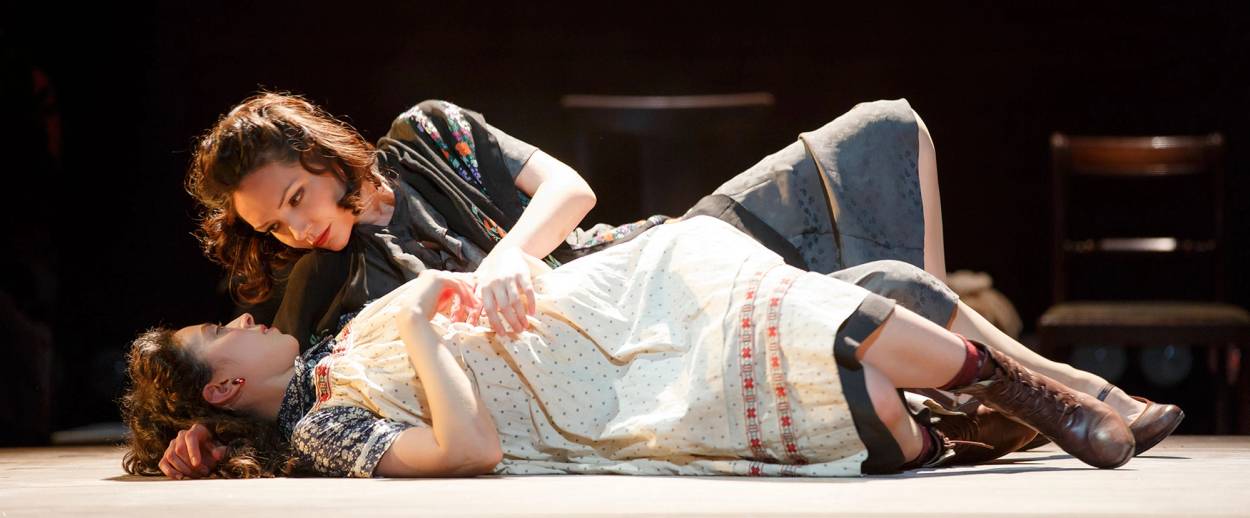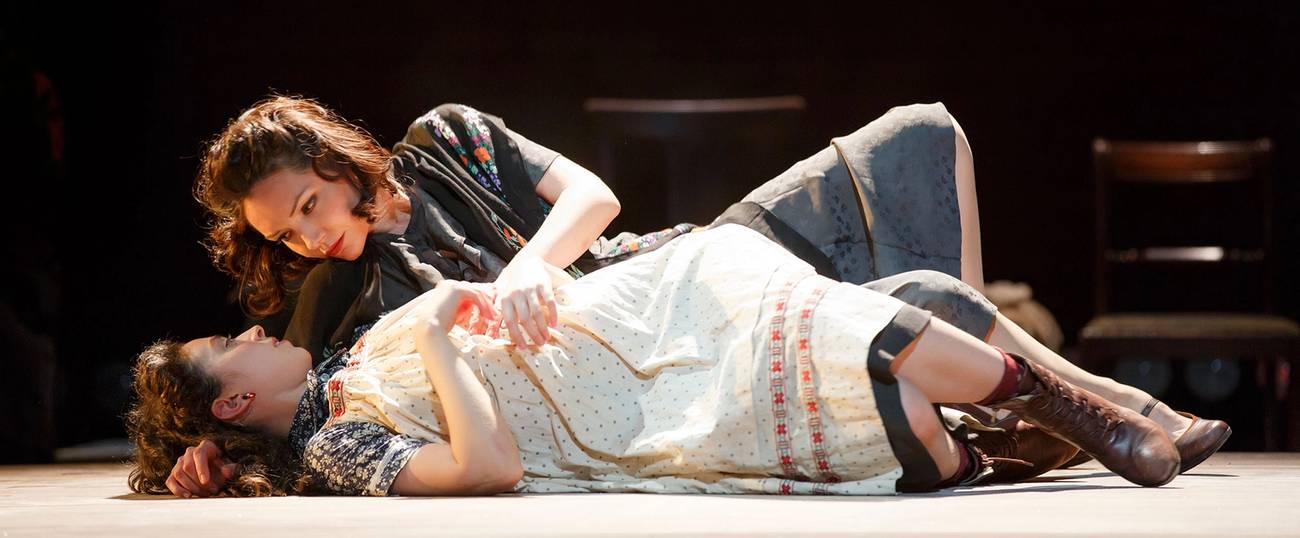Broadway’s First Lesbian Kiss Was Originally in Yiddish. Now It’s in New Haven.
With ‘Indecent,’ Paula Vogel and Rebecca Taichman return to Sholem Asch’s ‘God of Vengeance’ for the throbbing thrills only your grandmother could know




If you’ve read one Yiddish play in your life, chances are it’s Sholem Asch’s God of Vengeance. If you haven’t read it, don’t worry: Paula Vogel and Rebecca Taichman’s Indecent, having its world premiere at the Yale Rep in New Haven this month, is a delightful, unexpected, and surprising play about Asch’s play and a masterful exploration of the theatrical past and present.
A hit play written in Yiddish in 1907 by a largely unknown 27-year-old from Kutno, God of Vengeance tells the story of a brothel-owning Jew who hopes he can keep his teenage daughter pure and holy, even though his money derives from the business of sin. Of course, he can’t. The play had its premiere in German translation at the world-famous Deutsches Theater in Berlin, and within months it had been produced in Russian in Moscow, and in Yiddish in both New York and Chicago.
Plays about brothels weren’t unusual then. A few years earlier, George Bernard Shaw’s Mrs. Warren’s Profession had beaten the censors in London and New York, and Peretz Hirschbein had published Miriam in Hebrew and Yiddish; in the years that followed, Jewish pimps and prostitutes could be found everywhere from the stories of Sholem Aleichem to the pages of muckraking American magazines. What distinguished Asch’s effort was the play’s stark, moody dualism. A family’s home is built directly on top of the “cellar-brothel,” and the play stages a fierce, metaphorical battle between high and low, good and evil, kosher and trayf. As Isaac Goldberg, whose 1918 English translation was used for American productions in the 1920s, noted in his foreword, unlike Shaw’s play, Asch’s wasn’t “sociological” in intent, but rather a work of “poetic realism” with “symbolic power.”
It wasn’t this somewhat melodramatic, expressionist approach, but another distinctive facet of God of Vengeance that evidently captured Vogel and Taichman’s imaginations. The seducer of the brothel-owner’s virginal daughter, Rifkele, is not one of the shady pimps, as one might expect, but rather a young prostitute, Manke. The 1923 English-language production of the play, at the Apollo Theater on 223 West 42nd Street, presented the first same-sex kiss in the history of Broadway, leading to the entire cast’s being arrested on obscenity charges.
Indecent relates this production history (and much more) in brief scenes, leaping from Warsaw to Berlin to New York to Bridgeport, from backstage to the courtroom, and from the saloon to the rabbi’s pulpit. Vogel comes to Indecent having often treated the issues of sexuality and censorship; she has noted that she wrote one of her plays, Hot ’N’ Throbbing (1994), specifically to test the boundaries of the National Endowment for the Arts’ censorship of sex. The show has its origins in Taichman’s master’s thesis, at the Yale School of Drama, where Vogel now serves as a professor; back then, some 15 years ago, and still at the beginning of her career as a director, Taichman staged a play titled The People vs. The God of Vengeance.
Indecent is more chronologically straightforward and streamlined than some of Vogel’s best-known work, like her Pulitzer Prize-winning How I Learned To Drive (1997), which loops backwards and forward in time. As in many of Vogel’s other plays, actors play several roles from scene to scene. Yet while it relates historical events that took place in specific times and places, from Staten Island to the Lodz ghetto, it would be a mistake to think of it as aiming for historical precision: Vogel’s approach is to draw upon history, memory, and fantasy in equal measures, with dollops of repetition, cliché, and campy humor to complicate how we think about the past. It would be silly, then, to object that the characters in the play talk about “lesbians” more openly in scenes set in the early 20th century than seems historically plausible, or to say that the play’s treatment of Harry Weinberger as a villain seems a little bit unfair to the pioneering First Amendment lawyer (who figures here as producer of God of Vengeance on Broadway).
Indecent insists on itself as artifice, confection—in one moment, the actor playing Eugene O’Neill ostentatiously rips off his own mustache—which is fitting, because what remains fascinating about God of Vengeance is that it was a work of pure fiction, the product of Asch’s imagination, which had profound effects in the real world. One of the most striking moments in Indecent is a brilliant bit of staging in which Taichman has her actors perform the final, heart-wrenching lines of God of Vengeance—in which the brothel-owning father heaves his daughter, and the Torah scroll he has bought for her, down into the cellar—four times, rotating them 90 degrees each time. It’s as if we’re watching it first from the wings and backstage, and only finally seeing the conventional perspective the fourth time. This turns Asch’s moment of high drama into comedy—funny because it grants us a palpable sense of the uncanniness that theater companies must experience as they perform an intensely emotional crescendo night after night.
It’s the notorious scene from God of Vengeance in which two women kiss on stage—another moment that’s both fictional and powerfully real at the same time—that stands at the center of Vogel and Taichman’s play. In a sense, Indecent is a historical and imaginative dive into that single dramatic moment, which it refers to as “the rain scene” and stages again and again and again. Toward the end of Act 2 of God of Vengeance, Rifkele and Manke, appear on stage soaked by a spring rain. Manke, the prostitute, uses the language of legitimate sexuality and modesty to seduce the virginal Rifkele:
… we are bride and bridegroom, you and I. We embrace. (Places her arms around Rifkele.) Ever so tightly. And kiss, very softly. Like this. (Kisses Rifkele.) And we turn so red, —we’re so bashful. It’s nice, Rifkele, isn’t it? … And then we go to sleep together. Nobody sees, nobody hears. Only you and I. Like this. (Clasps Rifkele tightly to herself.) Do you want to sleep with me tonight like this? Eh?
Indecent wants its audience to understand all the ways in which these embraces, though fictional, have had real effects. We see Asch discuss the scene with his wife, and we watch a number of actresses—straight and gay, Jewish, German, and American—rehearse and perform it. The show climaxes with a bit of stage magic that transforms that scene into something that is at once more real, more fantastic, and more poignant than it ever could have been, or ever will be, in any actual production of Asch’s play.
There are moments where Indecent veers into farce and sentimentality, and, at least in one performance last week, there are times when the audience seemed genuinely confused about when to clap or laugh. But that’s part of what makes the show electric. Somehow, while being an elaborate, tightly controlled production, it retains a nervous energy that makes you feel, in a new way, the magic that’s possible when we sit together in the dark with strangers and watch a bunch of people pretend.
Indecent will be opening at the Vineyard Theater in New York in May, and at the La Jolla Playhouse in San Diego in November .
***
You can help support Tablet’s unique brand of Jewish journalism. Click here to donate today.
Josh Lambert (@joshnlambert), a Tablet Magazine contributing editor and comedy columnist, is the academic director of the Yiddish Book Center, Visiting Assistant Professor of English at the University of Massachusetts, Amherst, and author most recently ofUnclean Lips: Obscenity, Jews, and American Culture.